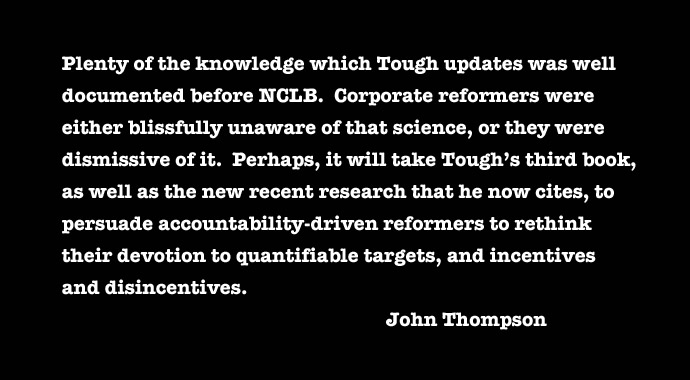Tough Spells Out What Kids Need: Does Any Reformer Care?

By John Thompson.
A first post summarized the way that Paul Tough’s new article, previewing his new Helping Children Succeed,explains why we must celebrate the fact that “the much-criticized No Child Left Behind Act, which dominated federal education policy for the past decade and a half, was finally euthanized.” I had hoped that Tough’s previous masterpiece, How Children Succeed, would convince corporate reformers to pull the plug on test-driven, competition-driven mandates. This second post explains why I fear that the Billionaires Boys Club will spin his new work as a justification for their test, sort, reward, and punish approach to school improvement.
Tough’s conclusion is unambiguously great:
Here’s a hopeful thought: Perhaps with the demise of the law, the education debates that raged so furiously during the No Child Left Behind era—on charter schools and Common Core, teacher contracts and standardized testing—might now give way to more-productive discussions about what low-income children need to succeed. We know a lot more than we did when the law was passed about the powerful environmental forces that are acting on many low-income children, beginning in infancy. And we know a lot more than we used to about what interventions and strategies—both at home and in the classroom—most effectively help these young people thrive in school and beyond. A national conversation that starts from this growing scientific consensus and moves forward into policy might be our best chance to improve the lives of the 51 percent of American public-school students who most need our help.
But, then comes the following:
This article is adapted from Paul Tough’s new book, Helping Children Succeed:Tough Spells Out What Kids Need: Does Any Reformer Care? - Living in Dialogue:
